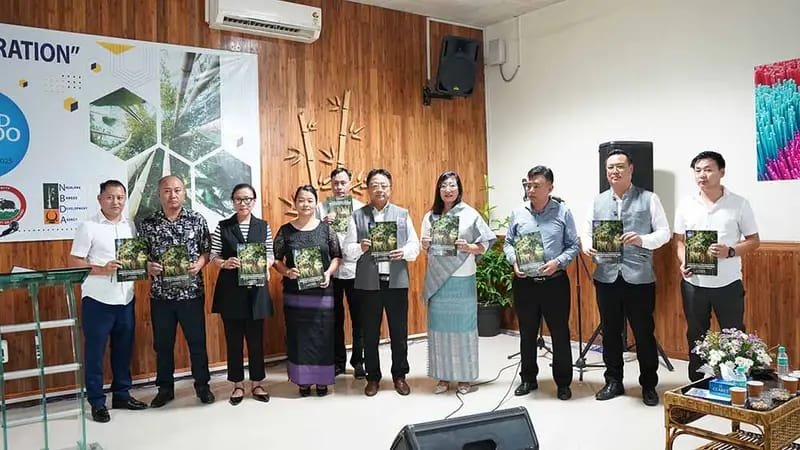Nagaland joined the global community in observing World Bamboo Day 2025 under the theme “Next Generation Bamboo: Solution, Innovation & Design”. The event, held at the Nagaland Bamboo Resource Centre in Sovima and organised by the Nagaland Bamboo Development Agency (NBDA), was more than a symbolic celebration. It was a statement about how bamboo—often called green gold—is shaping the state’s cultural identity, livelihoods, and sustainable future. Special guest Temsunaro Aier, Development Commissioner, Government of Nagaland, reminded participants that bamboo is not just a plant but a lifeline. From homes and crafts to food, music, and festivals, bamboo has been deeply embedded in the Naga way of life for generations. Aier described it as “green gold,” underscoring its cultural, ecological, and economic significance.
This perspective reflects a larger truth: bamboo is not merely a material but a sustainable ally—one that can bridge tradition with innovation while addressing urgent challenges like climate change, rural livelihoods, and eco-friendly development. Since its inception, the NBDA has spearheaded a transformation. What began as a small initiative is now a state-wide programme empowering artisans, farmers, and entrepreneurs. Training and skill development have enabled locals to diversify into bamboo-based enterprises, ranging from furniture and handicrafts to incense sticks, mats, blinds, and even edible bamboo shoots. Nagaland is steadily positioning itself as a hub for bamboo-based industries, thanks to entrepreneurial energy and collaborations with private partners. These ventures are opening new markets while preserving the ecological value of bamboo as a renewable and carbon-storing resource.
The celebration also spotlighted bamboo’s future potential. Aier highlighted the upcoming Cane and Bamboo Technology Centre, supported by the North Eastern Council (NEC), expected to be operational by the year’s end. This facility is envisioned as a hub for research, training, and mass production—bridging traditional wisdom with modern science to fuel large-scale innovation. NBDA State Mission Director, Kuko Mero, reinforced bamboo’s transformative role in Nagaland. With over 43 indigenous species thriving in the state, bamboo offers solutions for job creation, carbon storage, renewable energy, eco-housing, packaging, textiles, and low-carbon infrastructure.
Mero outlined NBDA’s achievements: 1506 hectares of block plantations across 17 districts, Training of 200+ artisans/entrepreneurs in crafts and marketing, Two Common Facility Centres, employing over 500 people, Processing units for toothpicks, incense sticks, briquettes, blinds, and tiles, 10 bamboo treatment plants and three nurseries with 1.5 lakh saplings, 30 rural haats and bazaars promoting bamboo crafts, Rebranding of Nagaland Handicrafts Emporium in Delhi and Kolkata under Naturally Nagaland Such milestones reveal how bamboo is being reimagined—not only as a traditional material but also as a modern economic engine for sustainable growth.
Nagaland’s World Bamboo Day celebration was more than an event. It was a reflection of the state’s determination to transform its natural wealth into global opportunity. The NBDA’s vision to integrate traditional bamboo knowledge with modern technology aligns with the theme of “Next Generation Bamboo”—a call for solutions, innovation, and design that can reshape industries worldwide. In the face of climate change, rural unemployment, and the search for eco-friendly alternatives, bamboo offers Nagaland both resilience and prosperity. By investing in research, technology, and skill-building, the state is not only preserving its heritage but also building a future-ready bamboo economy.
Nagaland’s World Bamboo Day Celebrating Green Gold and the Future of Sustainable Innovation, this celebration of World Bamboo Day in Nagaland served as both a tribute to heritage and a blueprint for the future. Bamboo, often called the green gold of Nagaland, is not merely a cultural symbol but a resource of immense ecological and economic value. Through the efforts of the Nagaland Bamboo Development Agency (NBDA), what was once considered a humble material has been transformed into a driver of innovation, livelihood, and sustainability. The establishment of plantations, training centres, processing units, and marketing initiatives demonstrates that bamboo can create opportunities for artisans, entrepreneurs, and farmers alike, while at the same time contributing to climate action through carbon storage and reduced dependence on timber. Yet the occasion was not simply about celebrating achievements; it was also about recognising bamboo’s untapped potential. The promise of a Cane and Bamboo Technology Centre signals the state’s ambition to integrate traditional knowledge with modern science, opening doors for eco-friendly housing, renewable energy, textiles, and global markets. The challenge ahead will be to ensure that these initiatives move beyond symbolic launches and truly transform the lives of people on the ground. For Nagaland, the task is not just to preserve bamboo’s place in tradition, but to reimagine it as a cornerstone of a sustainable, innovation-driven economy.
In essence, Nagaland’s World Bamboo Day was more than a cultural observance—it was a reaffirmation of the state’s belief that bamboo can be both a bridge between the past and a pathway to the future. If supported with the right policies, investments, and collaborations, bamboo could well become the foundation of Nagaland’s contribution to a greener, more resilient world.

